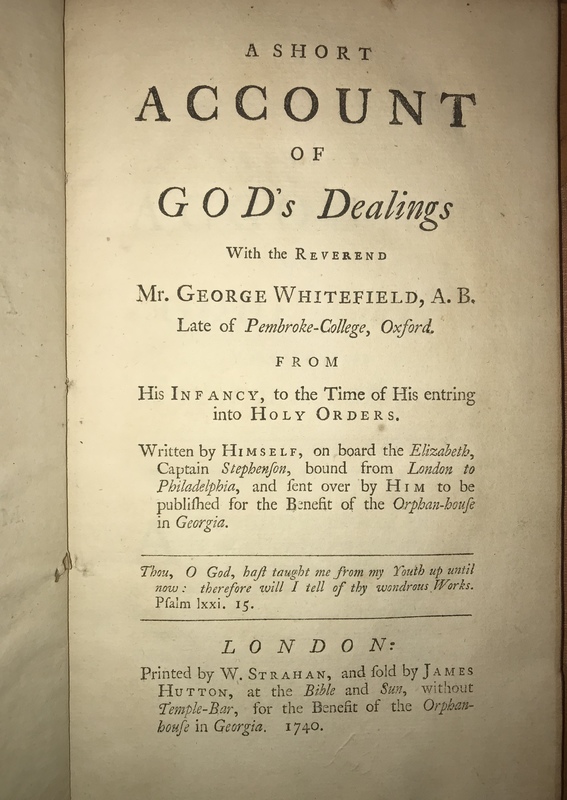A Short Account of God's Dealings with the Reverend George Whitefield
In 1740, Whitefield published a series of three documents to raise support to establish an orphan house in Georgia. In his first publication, A Short Account of God's Dealings with the Reverend George Whitefield, he constructed a narrative of his life in order to share with others to raise funds for the Bethesda Orphan House. Whitefield believed that he had been granted the power of the Holy Spirit and therefore was capable of carrying out this project.
In his narrative he states, “The benefit I have received from reading the lives of others, the examples we have in scripture of the sacred Authors composing their own histories and more specifically the the assistance I have had from the holy spirit, in bringing many things to my remembrance, which otherwise I would have forgotten, seemed reasons sufficient enough to justify my Conduct in the sight of god and good men.” ( A Short Account of God's Dealings With the Reverend George Whitefield, page 6). Today, the idea of writing a personal narrative about one's accomplishments would seem a bit conceited and self glorifying, however, there is no doubt that this idea came from a place of genuine passion to spread christianity. Whitefield was so famous during that time that his powerful voice demanded attention so much so that he preached over 18,000 sermons (George Whitefield : Life, Context, and Legacy). Whitefield traveled all over the American Colonies attracting thousands of listeners to hear his speeches that he felt led by the Holy Spirit to share. Since his sermons were so popular, they could not fit the crowds in even the largest churches and they had to be conducted outside. Therefore, whether people agreed with what he had to say or not, people were willing to listen.
Throughout his narrative, Whitefield speaks of his early childhood life up to the present time of him writing the narrative. He speaks of how he was mischievous as a child and would even steal food and money from his parents. Ironically, he only stole to give to the poor. Even as a child he, “endeavored to do all to the glory of God” (A Short Account of God's Dealings With the Reverend George Whitefield, page 32). Whitefield therefore makes it very clear throughout this narrative that he not only desired to spread his faith, but also had a special place in his heart for the poor and helpless, even from a young age. Growing up in Gloucester, England, he was raised very fortunate and was even able to attend Pembroke College. Creating this orphanage was Whitefield’s way of giving back to society. He believed that he had been “called out of darkness and into His marvellous light” and therefore had a duty to carry out the mission that the Lord laid on his heart.
